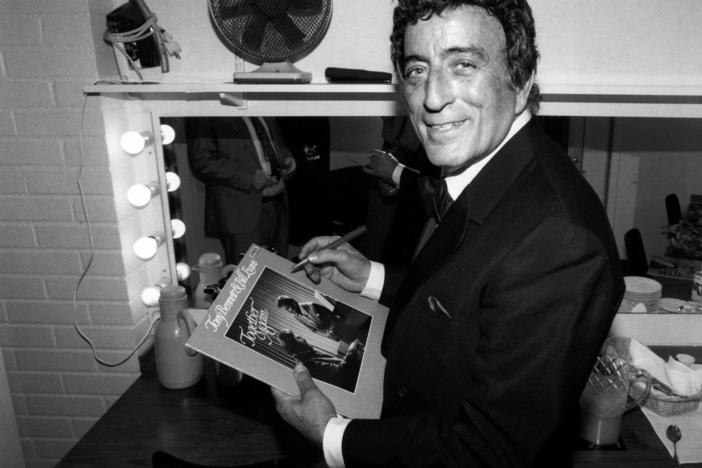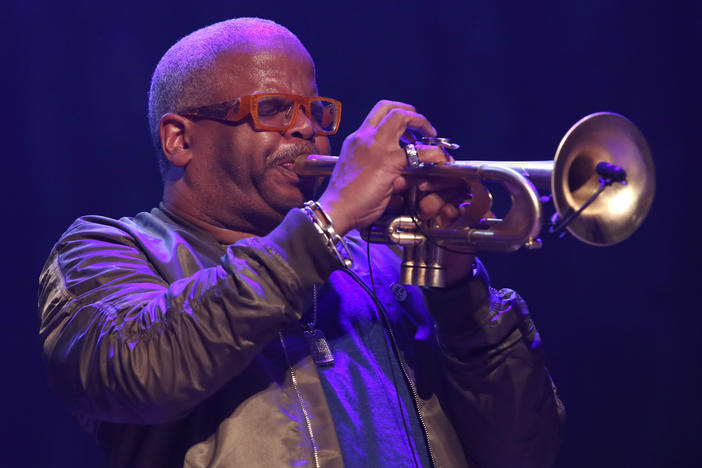Section Branding
Header Content
In New Orleans, Music Education Programs Cautiously Fall Back In Step
Primary Content
After months of silence, music programs are attempting to resume limited in-person rehearsals at NOLA public schools, where the stakes go far beyond what kids do with their after-school time.
Transcript
AILSA CHANG, HOST:
There will be no Mardi Gras parades next year in New Orleans. Since the pandemic hit in March, indoor music performances have been prohibited as well as the city's spontaneous street parades. But it's not just the professionals who are hurting. As Aubri Juhasz of member station WWNO reports, educators have been wrestling with how to safely resume music classes and band practice.
AUBRI JUHASZ, BYLINE: In the weeks after this year's Mardi Gras celebrations in February, New Orleans experienced one of the most explosive COVID-19 outbreaks in the country. Since then, Sonya Robinson has learned of numerous musicians and teachers who have been infected.
SONYA ROBINSON: You know, we have the largest percentage of Black educators in the country - probably concentrated - that are music educators, and we know that our community was one of the hardest hit.
JUHASZ: Robinson co-directs Artist Corp New Orleans, an arts education nonprofit that's in the process of developing recommendations for New Orleans public schools on how to resume music education during the pandemic. She says some teachers are eager to get back in the classroom, while others fear for their safety. Singing and wind instruments have been linked to superspreader events and practicing them requires careful planning.
(SOUNDBITE OF TROMBONES PLAYING)
JUHASZ: Edna Karr High School is considered to have one of the best marching bands in the city. But since the pandemic closed schools back in March, its musicians haven't practiced together. Many haven't practiced at all.
TY'CHELLE WATTS: I'mma (ph) tell the truth. I ain't touched a horn since last time we was in practice.
JUHASZ: Ty'chelle Watts is a senior who plays trombone. She finally picked up her horn at the end of October. That's when Edna Karr's charter operator allowed the band to start practicing in person.
(SOUNDBITE OF MARCHING BAND AMBIANCE)
JUHASZ: Rehearsals are outdoors and limited to small groups, no more than 25 students. Watts says it's upsetting starting the season late and not knowing whether they'll even get to perform.
WATTS: This is our senior year and we don't get football games. We don't get homecoming, senior night, like none of that. And that's really messed up. But I guess we got to deal with it. Enjoy what we got.
JUHASZ: The trombones are one of the band's biggest sections and have Tuesday practice all to themselves, which means they have band director Chris Herrero's undivided attention.
CHRIS HERRERO: So today, what we're going to do is working on getting your embouchure back in shape because I know y'all probably sound like doo-doo right now.
JUHASZ: Before Herrero was band director, he was a student in the band. He's in his early 30s and has already led Karr's musicians for more than a decade.
HERRERO: And one, clasp.
(SOUNDBITE OF TROMBONES PLAYING)
HERRERO: Woo (laughter).
JUHASZ: Doo-doo, indeed. But Herrero says there's still a massive sense of relief among the students.
HERRERO: They were frustrated because these kids had looked forward to being in Edna Karr's band since they were in middle school, when they started playing an instrument.
JUHASZ: Herrero says for many of the students, marching band isn't just an extracurricular; it's a family. The program helps kids get into college and provides them with a safe place to work through issues at home or school through music.
HERRERO: That's one thing that has worried me during this time. Like, what are my kids are doing right now?
JUHASZ: Herrero brings up Ivan Wheeler, a 16-year-old marching band drummer who was shot and killed in mid-October. Wheeler attended Landry-Walker High School, Edna Karr's rival.
HERRERO: Just think if band had been going full force the whole time, he probably wouldn't have been out there. Band gives kids that outlet and keeps them in a safe environment to not be in any type of situation where they might get hurt or in trouble or just be at the wrong place at the wrong time.
JUHASZ: Like many of his colleagues, Herrero believes that arts and music education are crucial to developing the whole student. In New Orleans, all public schools are charter schools. There's no standard arts program, and many don't provide any instruction at all. Schools, for the most part, are focused on high-stakes testing, which is tied to charter renewals. Jonathan Bloom works with Artists Corps and taught music in the city's public schools for almost 40 years. He says now is not the time to give up.
JONATHAN BLOOM: Nobody wants to drop the ball on their watch and say, well, look, we the generation that dropped it and music became insignificant - or it no longer exists. That's what's so scary about this virus, you know?
JUHASZ: It's the district's youngest students that concern Allen Dejan, a music teacher at KIPP Morial Primary. He says the marching band isn't made in high school. The work begins in his classroom.
ALLEN DEJEAN: It takes a lot of skill to actually be able to walk with a wind instrument, play it in tune, produce a good tone and produce a good sound. And those types of skills have to be developed before you get there.
JUHASZ: Dejean normally teaches students across five grades. This year, he's only teaching fourth-grade students because of the pandemic. With so many children receiving no music education, Dejean says there might be fewer high school drum majors and trumpet players further down the road, and the impacts will likely stretch even further.
DEJEAN: The local music economy doesn't start when people graduate high school. The local music economy starts when these children begin their music education journeys. Because these children are going to be part of this New Orleans music tradition.
JUHASZ: For NPR News, I'm Aubri Juhasz in New Orleans. Transcript provided by NPR, Copyright NPR.
Bottom Content



